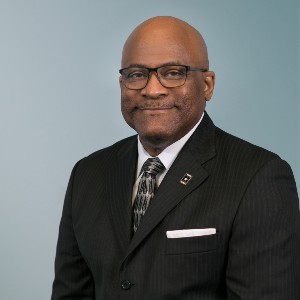Cornell Crews Jr.

After 24 years of serving our country in the U.S. Army, most of them in special operations, Cornell began his career in finance in 2000 as the Program Director at Partners for Self-Employment Inc. He oversaw the direct loan program for established small businesses and the start-up program for fledgling new ones. This allowed Cornell to have a hand in directly affecting the lives of not only the business owners but everyone they employ.
No “I” in Team
Cornell’s colleagues describe him as, “an exceptional leader” and “one of the most resourceful and well-connected people” they know. Cornell is on the board of multiple community-centric organizations holding a position on the board for each one. He strives to help make the community a better and more knowledgeable place. In 2014, Cornell was awarded the Community Economic Development Award by the South Florida Community Development Coalition. The award recognized his efforts to advance the economic viability of his community through economic and community development programs.
But it’s not the awards that give him the fuel to attack each day, it’s the impact that his words have on the people he’s helped.
“In the military, you are taught that you are no longer an individual, everything is a team game. I can’t do it without you, and you can’t do it without me. So, you know, awards and accolades are just not my things. The things that make me happy are when I see someone years later, and they remember something that I said or something in class that I taught. And that they are now implementing those teachings. I love when the lightbulb goes off above someone’s head and they just get it.”
A personal touch to financial guidance
One story, in particular, stood out the most to Crews.
“One lady in her early 40s comes to mind that I will always remember. I taught a lot of financial literacy classes and workshops, and she mentioned that she could not figure out why she couldn’t build up her savings. If she had money in her pocket, she felt the need to spend it.”
After speaking with her one-on-one, he found that her spending habits had a direct correlation with how her mother spent money.
“So, I spoke with her and began asking how her parents spent money when she was growing up. It turned out that she was the exact same as her mother. As soon as she had a dollar, she had to spend it. After explaining to her how parents are our first teachers and how she picked up that habit from her mother, she realized that she had to make a change.”
A few years after helping her make a change, she came back to show her appreciation to Cornell.
“Once we worked with her to change her habits, she ended up getting a house, she built up a savings and she was finally able to control her spending habits. She came back and happened to see me, and she said, ‘Cornell, I really appreciate you breaking everything down for me. I could not figure out why I could not do it for myself or why I wouldn’t do it, and you helped me solve that just by understanding I had learned that from my parents. It took some time, but I was able to unlearn those poor habits and change the way I spend money.’ I will always remember that woman and it was a great story for me and an even better ending for her.”
A commitment to succeed
Something that Crews believes very highly in, is commitment. Making change for good is hard for people to begin with, but if they put the necessary work in, that commitment will be the cornerstone of their success.
“You’ve just got to make the commitment to do it. Sometimes that is hard to do, especially when it comes to spending and saving money. If you have been doing these in a certain type of way for many years, it is hard to change. That is the one thing we fight as human beings. We fight change to no end. Once we are comfortable that’s it, we’re stuck. But I think that making that change and understanding that you can get comfortable doing it in a new way and it may be more beneficial.”